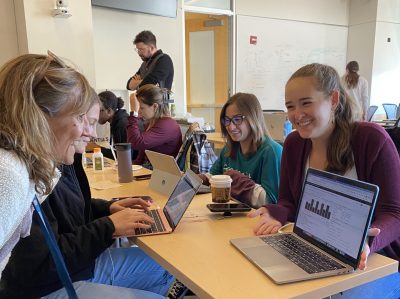UNC students and staff gather for the opportunity to work with real-world data
Over fall break, 20 UNC graduate students, postdocs, and staff members from the Department of Environmental Sciences and Engineering, the Curriculum in Toxicology, and Environmental Medicine gathered on campus for two days of hands-on training with a real-word dataset.

Dr. Julia Rager, DMAC leader
The PRogramming for Environmental HEalth And Toxicology (PREHEAT) Retreat was the result of a collaboration between the UNC SRP Data Management and Analysis Core (DMAC) and Research Experience and Training Coordination Core (RETCC). Participating students were divided into groups and assigned an environmental health question to answer through scripting activities.
“Through hands-on activities developed for this new training opportunity, students learned more about best practices for data management and analysis, coding, statistics, and machine learning,” explained Julia Rager, PhD, DMAC leader.
The data generated for the retreat was pulled from a real-world dataset acquired on human proteomic signatures – the analysis of all proteins from samples being measured, in this case central airway secretions, or induced sputum samples, taken from patients before and after exposure to wood smoke.

Dr. Ilona Jaspers, RETCC co-leader, and Dr. Elise Hickman, research fellow, reviewing coding outcomes
Participants also received a clinical overview of how the data were generated and learned best practices for using GitHub, a website and cloud-based service that helps developers store and manage their code.
No matter how experienced someone is with coding, there is always more to learn.
“I have been using R in my research for a couple of years, but all of my coding knowledge is self-taught.” said Elise Hickman, PhD, postdoctoral research fellow with Rager and an event attendee. “I was interested in attending this retreat to learn best practices from those with more experience and to familiarize myself with new types of data and analysis pipelines.”

Dr. Meghan Rebuli, RETCC co-leader
“Big data is the future in science and the PREHEAT Retreat was a wonderful opportunity for trainees to start building and developing a highly marketable skillset that is applicable to multiple job sectors,” explained Meghan Rebuli, PhD, RETCC co-leader.
Morgan Nalesnik, a 4th year graduate student in the Curriculum of Toxicology and Environmental Medicine, agreed. “The PREHEAT Retreat catered well to students with wide ranges of coding experience,” she said. “I now have a better understanding on how to properly reformat my data for analysis as well as new skills and resources to help troubleshoot tricky code.”

Morgan Nalesnik, graduate student
The retreat ended with students presenting and summarizing their group’s findings and highlighting what they learned about disease mechanisms and data analysis approaches. Scripts developed in groups were also uploaded to GitHub to allow for data analysis sharing moving forward, as well as reproducibility across UNC SRP projects and collaborators.
Ilona Jaspers, PhD, RETCC co-leader said “One of the most exciting outcomes of the retreat is that after working with a real-world dataset, trainees have the potential for their analyses to be included in a manuscript. This was truly hands-on!”
Given the positive feedback from participants and facilitators, DMAC and RETCC leaders plan to continue this collaboration and offer similar future events.
